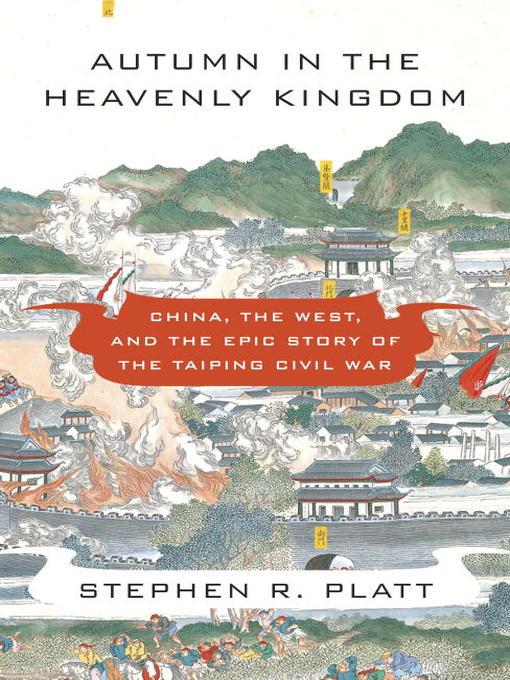
Autumn in the Heavenly Kingdom
China, the West, and the Epic Story of the Taiping Civil War
کتاب های مرتبط
- اطلاعات
- نقد و بررسی
- دیدگاه کاربران
نقد و بررسی

Starred review from November 14, 2011
History’s bloodiest civil war ended in 1864—in China. The cataclysmic Taiping rebellion is given a splendid account by UMass-Amherst historian Platt (Provincial Patriots: The Hunanese and Modern China). In 1837 a peasant named Hong Xiuquan announced that he was Jesus’ younger brother, sent to rid China of “devils” including its weak, corrupt, ethnically foreign Manchu rulers. His charisma attracted a vast following that by the 1850s had conquered a large area, the Taiping Heavenly Kingdom, with a capital at Nanjing. Despite the oddball theology, many Christian missionaries from England and elsewhere enthusiastically supported the Taipings, but could not win over their governments, who were preoccupied with pugnacious efforts to extract trading concessions from the enfeebled central government. Crushed with immense bloodshed, the rebellion left the Manchu dynasty even weaker, although it limped on for 50 more years. An upheaval that led to the deaths of 20 million, dwarfing the simultaneously fought American Civil War, deserves to be better known, and Platt accomplishes this with a superb history of a 19th-century China faced with internal disorder and predatory Western intrusions. 16 pages of photos; 5 maps. Agent: Brettne Bloom.

November 15, 2011
During years that overlapped the American Civil War, the Chinese were engaged in their own self-destructive conflict (1851–1864), which eventually claimed more than 20 million lives. Platt (Chinese History/Univ. of Massachusetts, Amherst; Provincial Patriots: The Hunanese and Modern China, 2007) maintains a generally descriptive, analytical, dispassionate voice, despite the savagery, arrogance and absolute mercenary and/or egotistical motives of the principal players. The author begins in 1853 with a quick description of the Qing dynasty, then in its second century of sway. Rising in opposition was the so-called Taiping Heavenly Kingdom, whose sub-monarchs went by names like Brave King and Loyal King. Weaving their way into the fabric were various Western Christian missionaries hoping to covert the masses, aligning themselves with the rebels, who were infused with a sort of hybrid Christianity. The French and British nervously observed, concerned about protecting their trade channels, sometimes venturing into battle, supplying arms, ships and leadership. Although there were too few of them in country to occupy territory, Platt shows that the armaments and early support were important factors in the eventual defeat of the initially dominant Taiping. By 1861, of course, the Americans were engaged in their own civil war; the North feared the British would side with the Confederacy and were relieved when they opted for China instead. Platt tells all of these stories in a seamless narrative, moving gracefully from one point of view to the next, relating strategies, presenting personalities and illuminating political complexities. In general, he allows the horrors of war--mass executions, rapes, starvation, cannibalism, cholera and overall depravity--to speak for themselves. The author raises a curtain to show us events largely unknown in the West--yet achingly familiar as well.
(COPYRIGHT (2011) KIRKUS REVIEWS/NIELSEN BUSINESS MEDIA, INC. ALL RIGHTS RESERVED.)

February 1, 2012
By the 1850s, China's Qing dynasty had held power for over 200 years, with peasants more and more having to endure privation, starvation, and disease. Ordinary Chinese believed the Qing, who were ethnic Manchu, were ineffective against "foreign devils" and in the Opium Wars with Britain. Enter Hong Xiuquan, failed civil servant and a convert to Christianity who believed he was Jesus's brother. He set off the immense and brutal civil war known as the Taiping Rebellion and established the breakaway state of the Taiping Heavenly Kingdom. Platt (history, Univ. of Massachusetts, Amherst), as his subtitle shows, prefers to call it a civil war, the most devastating in history, with over 20 million killed, with brutality on both sides. The rebels, the majority ethnic Han, had strength in their great discipline and fanaticism. They would take a city, then move to the countryside enlisting farmers to join the battle against ruling forces. The Qing ultimately crushed the rebellion with help from trading partners in the West. VERDICT Platt's study of this era will be challenging for general audiences, but specialists and those seeking a serious study of the topic will appreciate it.--Susan G. Baird, formerly with Oak Lawn P.L., IL
Copyright 2012 Library Journal, LLC Used with permission.

Starred review from January 1, 2012
Platt presents the perplexing Taiping Rebellion that convulsed China's Qing dynasty from 1851 to 1864. Overlapping with additional portents that the Qing had forfeited the mandate of heaven, such as territorial cessions to Russia and the Anglo-French capture of Beijing, the turbulent times tested the loyalty of imperial officials like Zeng Guofan. Tracking his apparently amply documented career, Platt richly portrays Zeng's inner self-doubts about his outer presentation as the general tasked to subdue the Taiping rebels. On their side, Platt has a comparably knowable character named Hong Rengan, a Christian convert whose relative, Taiping leader Hong Xiuquan, proclaimed himself the Heavenly King and younger brother of Jesus. However eccentric Taiping theology was, it was the rebels' control of the Yangtze River and environs that vexed foreign powers trying to extract concessions from the Qing government. From attacking the Qing in 1860, Britain performed a volte-face by fighting the rebels with a mercenary army raised by another bizarre figure, American freebooter Frederick Ward. Incorporating his perceptive characterizations and a comprehensible account of Zeng's ultimately victorious military campaigns, Platt has skillfully converted his erudition into an eminently general-interest treatment of what may have been the most lethal civil war in world history.(Reprinted with permission of Booklist, copyright 2012, American Library Association.)

























دیدگاه کاربران